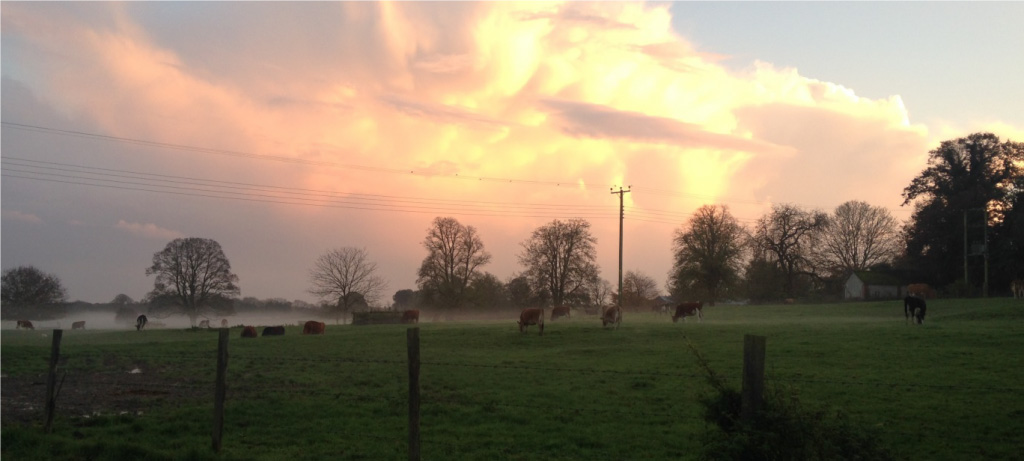A radical plan for community ownership and regenerative farming.
The Chettle Estate in North Dorset consists of nearly 900 acres of arable and pasture land including 60 acres of woodland. It has a thriving village shop, a well-respected restaurant with 8 rooms (the Castleman Hotel) and 33 dwellings in the village of Chettle. The estate, which is recorded in the Domesday Book, is owned by Alice Favre, who inherited Chettle two years ago from her unconventional mother, Susan, who in turn inherited it from her mother. Susan was a great custodian and took the estate into the 21st century whilst continuing the feeling that it was still bumbling along in the 1970s, when community was still at the heart of any village. This strong sense of community has been lost in many places, especially amongst the villages in Dorset where many cottages are just second homes. Susan instilled in Alice many different values, the most important ones being a love of the village and the land it is nestled within, a strong work ethic and not to be interested in money and the trappings of it.
On inheriting the estate Alice realised that she had a once-in-a-lifetime opportunity to regenerate its ecosystems, food production and infrastructure. Her vision, developed through a workshop with key stakeholders, is:
- to radically and rapidly redesign the land use of Chettle Estate to create our own regenerative ecosystem, with thriving biodiversity and abundant food production.
- to simultaneously create climate resilience for the future, decarbonise our lives and re-carbonise our land, whilst galvanising a regenerative culture throughout the community.
As Alice says in the introduction to the Chettle Land Management Vision:
I want to try and challenge the destructive status-quo, for the greater good of the world, inspiring others to do the same, on whatever scale possible; whether that is buying better food, campaigning for a healthier planet, consuming less, shopping more locally, investing in their communities or changing the way land is farmed. There is growing evidence that the world only has 10 years to make significant and radical changes before the destruction of humanity is unstoppable and I want to be part of the new path forward. I believe we need to give others hope, and to do that we need to actively lead the way, show that change is possible and necessary: “Hope is a verb with its sleeves rolled up.”
Alice Favre
We are delighted to be working with Alice to help her realise her innovative and radical vision. This aligns perfectly with our own mission and promises to create a practical demonstration of what is possible – and is so badly needed – in many of our agricultural landscapes. Around Chettle, as in so much of the countryside, food is mostly grown to feed livestock or export into national supply chains and production for local consumption has been lost. Re-localising our food supply and regenerating the land to tackle the climate and ecological breakdowns have never been so urgently needed.

Alice’s goal is to hand over control of land and buildings at the heart of the village and estate to a new community benefit society which will own and operate a new Chettle Food Hub enterprise. This will comprise of:
- a new mixed farm – a new regenerative and ethical farm on 57 acres, generating vegetables, herbs, eggs, honey, heritage wheat, dairy products and meat.
- a new shop premises – Chettle already has a thriving village shop and this will be moved to bigger premises within specially converted barns. This business, which is currently owned by the estate, will be transferred into the new community benefit society.
- a new cafe – set up in a barn adjacent to the new shop premises which will create seasonal dishes with an aim to serve dishes that are almost 100% grown on the mixed farm attached to it..
The shop and cafe will sell produce from the farm and visitors will be able to see where and how their food is grown through farm visits. The Food Hub will be a single entity, with staff employed across the supply chain, from the farm to the table, to ensure consistency and quality. Workers will also be paid a fair wage, an ethos that is at the heart of the plan, the countryside needs to attract new entrants to farming and a living wage is one of the steps to do this.
Over the coming months detailed plans are being made to decide how the different enterprises will function and work together, develop a business plan with financial forecasts, identify the capital works needed, involve the local community and secure planning consents. The community benefit society is being registered using the Wessex model rules and the Founding Directors aim to take on the management of the existing shop as one of their early tasks. Applications are also being made to grant-making trusts to fund the development stage, which involves a diverse team of specialists including Terra Perma Geo (planning and architecture) and The Apricot Centre (regenerative agriculture).
The aim is to launch a share offer to help fund the capital works later in 2022, once the plans have been drawn up. Wessex will be working with Alice and the new CBS right through the process and we’ll share news of the journey as it progresses.

